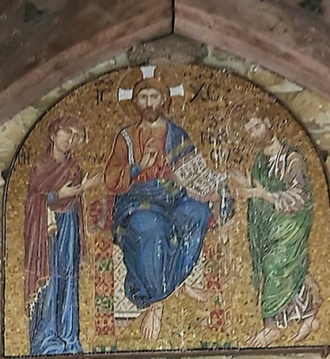Sunday Reflection with Canon Robin Gibbons - 19th September 2021

Mosaic and Swallow Nest above Rousham church door Oxfordshire
Twenty Fifth Sunday in Ordinary TimeWhat exactly does Jesus mean when he says as quoted in Mark 9:37, "Whoever receives one child such as this in my name, receives me; and whoever receives me, receives not me but the One who sent me." We find it repeated in Matthew 18:4,5, but followed by a severe warning in verse 6: "Whoever causes one of these little ones who believe in me to sin, it would be better for him to have a great millstone hung around his neck and to be drowned in the depths of the sea" (Mt 18:6) in Mark 10: 41 and in John 13, Jesus stresses the word receives; "Amen, amen, I say to you, whoever receives the one I send receives me, and whoever receives me receives the one who sent me". (Jn 13:20) We can grasp the connection Jesus is making with the one he calls Abba, that intimacy he draws us into throughout his mission to show he and the Abba are one, and also note that those who act in his name are somehow very much part of his mission, this of course is further underscored by our appreciation of that gift of the `Spirit who reveals, opens, points us to these connective moments.
In fact, as we might say in a later development of theological understanding of presence, those who are sent in His name are truly 'icons of Christ'! We can say in the words of St John of Damascus: ' Because of the Incarnation, I salute all remaining matter with reverence, because God has filled it with his grace and power. Through it my salvation has come to me'.
But how is this connected with the children Jesus uses as primary examples of reception by others? How are we to understand what is obviously a key insight into relationships with Christ in the Kingdom of God? The Greek word for receive here is dechomai, its various expressions of use give us important pointers. We discover it means 'to take hold of with the hand', a trusting and important gesture in human relationships. Then we find it used in the sense of 'take up, receive', allowing strangers access to us, being open in that sense of not being inhospitable and welcoming friendship with them, but it also applies to our own reception of other people's hospitality gracefully. In fact it means a whole attitude of being, going so far as to bring somebody up if need be, offering help in reaching out, communicating and giving practical help, taking upon oneself others needs, but above all in that great command to love our neighbour which means friendship with others, not rejection! At the heart of all this is the welcome love of Christ, if that is our start then we can see that Jesus in placing the children before us is never saying become like children, but that we should welcome, accept those who are powerless, whose lives depend on us for sustaining love.
We can of course go on and use the example of children in terms of vulnerability, those who have no power and for whom we are to have the utmost care, nurturing, teaching, supporting them by those elements contained in that word dechomai. Place this passage in the context of an argument about power and suddenly it makes more sense, Jesus rejects such power, in his perspective power is not strength, wealth, fame, but enabling others to take their place in life, particularly those who have no power, the little ones, the children, the vulnerable, the hapless animal creation in our care. To receive is also to do as Christ did, to cherish in love those given to us, but to do this in His name, as he would, as God asks of each of us. It is a commitment, in the true meaning of obedience as dialogue and revelation, to tending to and protecting God's people, land, creatures that come to be received by us. Amen
Lectio
From the Sayings of the Desert Fathers
Abba Nisterus
A brother questioned an old man saying, "What good work should I do so that I may live?" The old man said, "God knows what is good. I have heard it said that one of the Fathers asked Abba Nisterus the Great, the friend of Abba Anthony, and said to him, 'What good work is there that I could do?' He said to him, 'Are not all actions equal? Scripture says that Abraham was hospitable and God was with him. David was humble, and God was with him. Elias loved interior peace and God was with him. So, do whatever you see your soul desires according to God and guard your heart.'"
A thought from Hildegarde of Bingen
"Don't let yourself forget that God's grace rewards not only those who never slip, but also those who bend and fall. So sing! The song of rejoicing softens hard hearts. It makes tears of godly sorrow flow from them. Singing summons the Holy Spirit. Happy praises offered in simplicity and love lead the faithful to complete harmony, without discord. Don't stop singing."
Karl Barth
(He understands children here as beginners)
Christians who regard themselves as big and strong and rich and even dear and good children of God, Christian who refuse to sit with their Master at the table of publicans and sinners, are not Christians at all, have still to become so, and need not be surprised if heaven is grey above them and their calling upon God sounds hollow and finds no hearing. The glory, splendour, truth, and power of divine sonship, and of the freedom to invoke God as Father, and therefore the use of this freedom - the Christian ethos in big and little things alike - depends at every time and in every situation on whether or not Christians come before God as beginners, as people who cannot make anything very imposing out of their faith in Jesus Christ, who even with this faith of theirs - and how else could it be if it is faith in Jesus Christ? - venture to draw near to his presence only with the prayer: "Help my unbelief" (Mk. 9:24). Mark well that this has nothing to do with Christian defeatism. It describes Christians on their best side and not their worst, in their strength and not their weakness (2 Cor. 12:10).


















